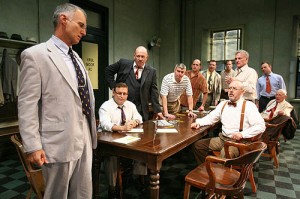Jurors Gone Wild
 During Senator Ted Stevens’ corruption trial, the jury foreperson urged U.S. District Judge Emmet Sullivan to dismiss one juror, whose “violent outbursts” and disrespectful behavior were disrupting jury deliberations. In response, Judge Sullivan counseled the jurors to be “courteous and respectful of each other.” It seems that, at least in this case, a warning was enough to make jurors behave . . .
During Senator Ted Stevens’ corruption trial, the jury foreperson urged U.S. District Judge Emmet Sullivan to dismiss one juror, whose “violent outbursts” and disrespectful behavior were disrupting jury deliberations. In response, Judge Sullivan counseled the jurors to be “courteous and respectful of each other.” It seems that, at least in this case, a warning was enough to make jurors behave . . .
Judge Sullivan’s reluctance to meddle with jury communications is understandable; after all, a mistrial could be declared if it were found that he exerted unfair influence over the jury. Yet, if judges adopt overly lax attitudes and fail to remove problematic jurors, other problems can arise.
For example, in the 1985 case Hernandez v. United States, a trial court for the Eastern District of New York failed to dismiss one juror when the others complained that she was mentally incompetent. Although the court eventually dismissed the troublesome juror, it did so during deliberations in which she was the sole hold out; as a result, the Second Circuit reversed the trial court, stating that by delaying dismissal, the court created the improper appearance of dismissing to avoid a hung jury.
During the course of trial, jurors can be dismissed for a variety of reasons, such as incompetence, illness, death, or death of a loved one. Commonly, dismissal is based on a juror’s inability to remain fair and impartial. For example, a juror’s impartiality can be tainted if he or she gains access to forbidden media coverage of the trial, even if that access was inadvertent. In addition, according to the Second Circuit, jurors can be removed based on evidence that they intend to nullify the law.
Traditionally, jurors have received limited instructions regarding deliberations. Basically, they’re told: consider the evidence, talk with other jurors about it, but don’t change your opinion just to conform to others’ views or to reach a verdict.
Are these minimal instructions sufficient though? It seems to me that a juror could easily mistake dissatisfaction over another juror’s performance (i.e. incompetence) for a disagreement over evidence – an improper ground for dismissal.
Defense lawyers commonly view tension among jurors as positive, as it ups the chances that they won’t reach a unanimous decision required for a guilty verdict. Unfortunately for Stevens (and his superstar lawyer, Brendan Sullivan) his jurors, including the especially riotous one, agreed on at least one thing – the senator was guilty.

Comments